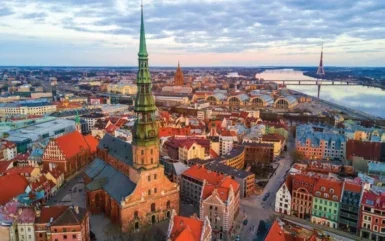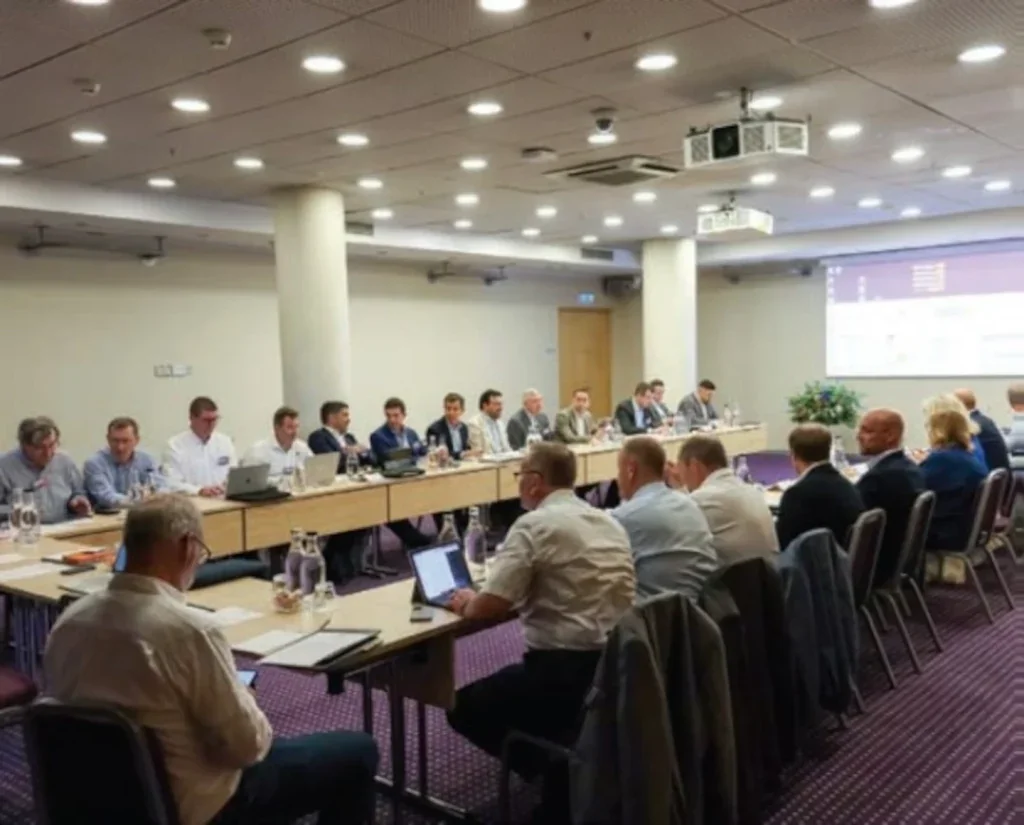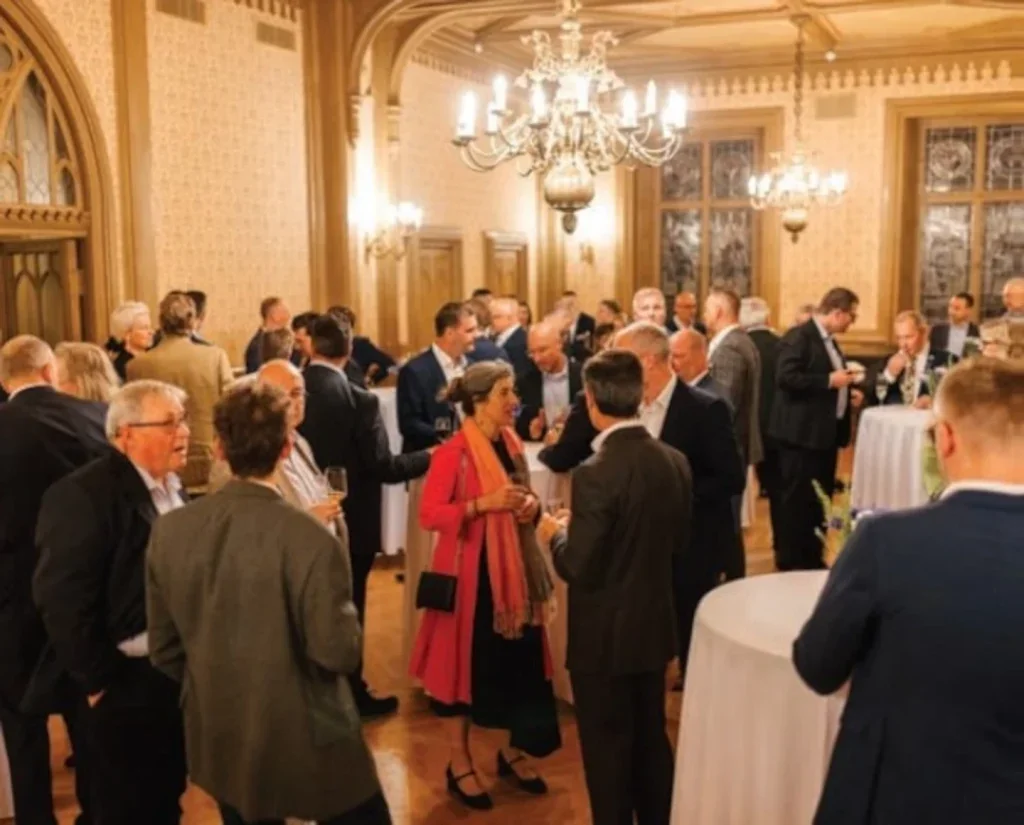
Riga in Latvia was the location for this year’s annual European Panel Federation (EPF) AGM and conference, an event firmly established as an informative, unifying and excellent networking event in the woodbased panels industry.
Host plywood producer Latvijas Finieris proudly welcomed about 180 professionals and high-level guests from across Europe and beyond to the June 19-21 event.
The choice of location and activity of the host were significant. Visiting a leading plywood producer in the Baltics, underlined that EPF represents all panel types, from particleboard to plywood, via MDF, OSB, hardboard and softboard, and across all of Europe from north to south, from west to east.
Sponsorship backing came from Surfactor, Siempelkamp, Govi, Prefere Resins, AFRY and VIOBOND.
A gala dinner preceded the open conference session on June 21.
MARKET PERFORMANCE
A summary of markets and the performance of the European wood-based panels sector in 2023 – contained in the EPF’s Annual Report 2023/24 – were highlights of the conference.

European wood-based panels production declined by a “disappointing” 6.3% in 2023 to an estimated 56.5 million m3, according to the latest statistics unveiled by the EPF. This follows a 7.7% decline in 2022, though admittedly that followed a record high production year in 2021 during the “Covid wave”.
However, a positive angle was that wood-based panels exceeded the overall performances of the two main end-user sectors (furniture and construction), suggesting a gain of share in both segments for wood.
The figures are contained in the EPF’s Annual Report 2023, released at the Federation’s AGM on June 19-21 in Riga, Latvia, hosted by Latvian plywood producer Latvijas Finieras and attended by 180 industry professionals.
OSB was the sole panel product area that saw production growth in 2023 in the EU27/ UK/EFTA region at +2% to 6.6 million m3 (2022: 6.5 million m3).
The largest product area – particleboard – recorded a -5% reverse with a 30.9 million m3 production (2022: 32.5 million m3). MDF saw a bigger drop at -11% to 11.1 million m3 (2022: 12.5 million m3).
Germany remained the largest particleboard producing country in Europe with 5.05 million m3 in 2023, down by 8.6% compared to 2022. Germany also remains by far the largest European MDF producer with 2.75 million m3, its output down by 8.2%.
Softboard – mainly wood fibre insulation boards – has been an area of significant growth in recent years, but this product area declined by 6% in 2023 to 4.8 million m3 (2022: 5.2 million m3).
Plywood production saw a large -15% decline to 2.6 million m3 (2022: 3.1 million m3), while the final panel product area – hardboard – saw a 17% reduction, though this is the smallest product area for the European wood-based panels industry at 400,000m3 (2022: 500,000m3).
Low consumer confidence during 2023 explained by uncertain economic situations led to a lower demand for furniture, including the kitchen segment. The usage of wood-based panels in this end-use decreased from 48% in 2022 to 47% in 2023. The furniture industry remained the largest enduser of wood-based panels in EPF countries.
The building industry, including doors and flooring applications, accounted for an increasing share of 39% of the overall production.
The remaining 3% (stable compared to 2022) and 11% of the WBP production went to the packaging sector and other applications respectively.
The EPF’s projections for 2024 are for a return to a slight production growth.
In the particleboard sector, EPF predicts output to rise to 31.5 million m3 in 2024, a boost of roughly 500,000m3.
In OSB, production is predicted to rise about 150,000m3 to 6.75 million m3.
Plywood production is also expected to see a slight rise in 2024, both the EU27 and in total Europe (including Belarus, Russia, Turkey and Ukraine), with the former up about 40,000m3 and the latter up about 50,000m3.
MDF production capacity is likely to tick up very marginally, whether viewed as an EPF countries region or the EU27 – both zones expected to rise by 90,000m3 in 2024. MDF consumption is expected to rise by the same marginal levels.
EPF members used the event to endorse the launch of a self-commitment to accept MDF and plywood waste material at their wood waste management centres within their plants.
EPF says it is proud of its members’ use of recovered wood and recycled wood. This is part of EPF’s sustainability approach, which sees cascade use and recycling as a key contribution to resource efficiency and the circular economy
MANAGING BOARD CHANGES
A major highlight of the Riga meetings was the introduction of Pablo Figueroa López as the new EPF chairman (see pp36-38 for an interview with the new chairman), succeeding Martin Brettenthaler, after the latter officially concluded his tenure in March.

Ms Veronique Hoflack was unanimously elected the new vice-chair of EPF. CEO of Unilin Panels and a managing board member since 2022, Ms Hoflack now emulates her predecessor Bernard Thiers in assuming the role as vice-chair for the federation.
She is joined on the EPF managing board by Georg Maeder (Swiss Krono Group) whose nomination was also unanimously supported by the EPF General Assembly.
The conference session saw Katharina Knapton-Vierlich, DG GROW, European Commission, give the keynote presentation on ‘Biomanufacturing in the EU: The importance of the forest-based sector”.
Ms Knapton-Vierlich updated delegates on how the Commission has proposed a series of targeted actions to boost biotechnology and biomanufacturing in the EU.
The communication on ‘Building the future with nature’ identifies the challenges and barriers and proposes to tackle them, in line with the communication on the long-term competitiveness of the EU.
The Commission has said that advances in life sciences, supported by digitalisation and artificial intelligence (AI), and the potential of solutions based on biology to solve societal issues, make biotechnology and biomanufacturing one of the most promising technological areas of this century.
They can help the EU to modernise its agriculture, forestry, energy, food and feed sectors and industry.
In addition, these technologies can contribute to a more competitive and resilient EU, that provides better healthcare to its citizens, and succeeds in its green and digital transitions.
But the EU biotechnology and biomanufacturing sector is facing several challenges: research and technology transfer to the market, regulatory complexity, access to finance, skills, value chain obstacles, intellectual property, public acceptance and economic security.
Ms Knapton-Vierlich said some potential next steps for action include:
- Simplifying regulatory frameworks and market access
- Creating an EU Biotech Hub
- European standards for biotechnology and biomanufacturing
- Encourage more private investments
- Gaining profile through labelling of biobased products
- Revising PEF (Product Environmental Footprint) by 2025, towards fair comparisons between bio-based and fossilbased products
- Bio-based content requirements in specific product categories and in public procurement
- Updating the EU Bioeconomy Strategy by 2025 reinforcing the industrial dimension for a stronger EU economy.
The next EPF AGM will take place on June 25-27, 2025 in Berlin, Germany, hosted by EPF national member association, VHI, the Verband der Deutschen Holzwerkstoffindustrie.






